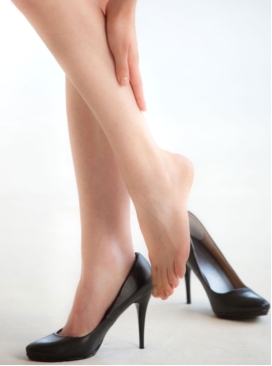Heel Pain in business women, yup it’s those heels…

Arthritis Foot Pain
August 14, 2023
Who or what is Morton’s Neuroma?
August 14, 2023Heel pain is a common condition that can affect people of all ages and can be caused by various factors. The most frequent cause of heel pain is plantar fasciitis, but other conditions can also contribute to discomfort in the heel area. Here are some common causes of heel pain:
- Plantar Fasciitis: Plantar fasciitis is the inflammation of the plantar fascia, a thick band of tissue that runs along the bottom of the foot from the heel to the toes. This condition is often caused by repetitive strain, excessive weight-bearing activities, or improper footwear. People with plantar fasciitis typically experience sharp, stabbing pain in the heel, especially in the morning or after periods of rest.
- Heel Spurs: A heel spur is a bony growth that may develop on the underside of the heel bone. It often occurs in conjunction with plantar fasciitis. Heel spurs themselves may not cause pain, but they can exacerbate the symptoms of plantar fasciitis by further irritating the surrounding tissues.
- Achilles Tendinitis: The Achilles tendon connects the calf muscles to the heel bone. When this tendon becomes inflamed due to overuse, injury, or poor biomechanics, it can cause pain in the back of the heel. Achilles tendinitis is common among athletes who engage in activities that involve repetitive jumping or running.
- Heel Bursitis: Bursae are small fluid-filled sacs that act as cushions between bones, tendons, and muscles. Inflammation of the bursa located at the back of the heel can lead to heel bursitis, causing pain and tenderness.
- Stress Fracture: Repetitive impact and overuse can cause tiny cracks (stress fractures) in the heel bone, resulting in pain during weight-bearing activities.
- Tarsal Tunnel Syndrome: Similar to carpal tunnel syndrome in the wrist, tarsal tunnel syndrome occurs when the tibial nerve is compressed or pinched as it passes through a narrow tunnel in the ankle. This can cause pain, tingling, and numbness in the heel and the sole of the foot.
- Nerve Entrapment: Nerves in the foot can become compressed or entrapped, leading to pain in the heel or surrounding areas.
- Arthritis: Inflammatory arthritis, such as rheumatoid arthritis, or osteoarthritis affecting the joints of the foot can cause heel pain.
Treatment for heel pain depends on the underlying cause and may include:
- Rest and avoiding activities that exacerbate the pain.
- Applying ice to reduce inflammation.
- Wearing supportive footwear with cushioning and arch support.
- Stretching and strengthening exercises for the foot and calf muscles.
- Physical therapy to improve flexibility and relieve pressure on the affected area.
- Over-the-counter pain medications or anti-inflammatory drugs.
- Corticosteroid injections for severe inflammation and pain.
- Custom orthotics to provide additional support and alleviate pressure on the heel.
- Surgery in rare cases when conservative treatments do not improve the condition.
If you experience persistent or severe heel pain, it’s essential to consult a healthcare professional for a proper diagnosis and appropriate treatment plan tailored to your specific needs. Call Houston’s Foot Doc today. 713.529.1010



